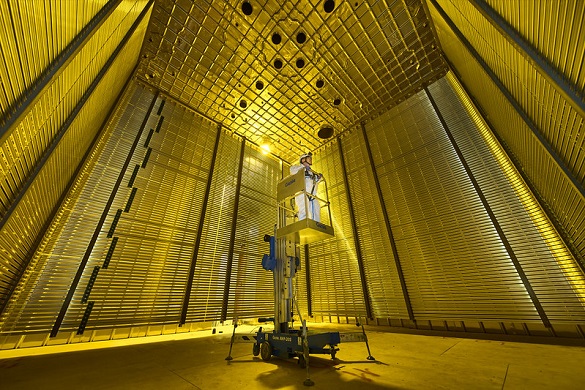University of Liverpool physicists are contributing to the production of vital equipment for the flagship DUNE global science project.
DUNE (the Deep Underground Neutrino Experiment) is hosted by the United States Department of Energy’s Fermilab. The UK government has invested £65million in the DUNE experiment which will study elusive neutrinos in a bid to advance our understanding of the origin and structure of the universe.
As part of this investment, UK partners are delivering a series of vital detector components built at the Science and Technology Facilities Council’s Daresbury Laboratory, located at Sci-Tech Daresbury in the Liverpool City Region.
Physicists at the University of Liverpool are playing a key role in this and Professor Christos Touramanis heads up a consortium of 22 UK and US institutes that will deliver Anode Plane Assemblies (APAs) to the experiment.
Anode Plane Assemblies
Scientists will capture the neutrinos in detectors containing 17,000 tons of liquid argon.
The tiny electrical signals of neutrino interactions will be read out by Anode Plane Assemblies (known as APAs) – huge rectangular planes covered with thousands of copper-beryllium wires, about the width of a human hair.
Each APA stands at an impressive 2.3m by 6.3m – making them the largest individual components for DUNE, and they have to be built with millimetre precision.
Daresbury Laboratory – with its university partners including the University of Liverpool – will ultimately produce 150 APAs for DUNE.
To meet this need, a large purpose-built APA factory was created at Daresbury inside a former accelerator hall, and 20 specific jobs were created for this task.
Making excellent progress
The Daresbury team has now started the production of the first APA for ProtoDUNE-II.
The high-precision APAs will first undergo cryogenic testing in the ProtoDUNE-II detector at CERN before the full set of APAs for DUNE are built, a process that will take several years to complete.
Physicists from the Universities of Liverpool and Manchester also provide the scientific leadership of the project.
Professor Christos Touramanis said: “The start of APA production at Daresbury is a tremendous achievement after a year of COVID-19 lockdowns and other disruptions. It is a vindication for the University of Liverpool neutrino group with some of our scientists and engineers lead design, procurement and quality assurance with a particular focus on metrology. The mechanical workshop of the Department of Physics has made the high-precision active wire control and recording head that is used to make these large size very precise instruments. We are all very excited and we look forward to the world leading science that these instruments will deliver.”
Executive Chair of STFC Professor Mark Thomson, said: “It is impressive that the project team continues to made excellent progress in such a challenging year. This development means that 2021 should be the year of the Final Design Review and beginning of ‘mass’ production of APAs at Daresbury – a huge milestone for everyone involved and a major step towards the construction of this incredibly exciting neutrino experiment.
“I am deeply proud of the team at Daresbury for how hard they have continued to work in difficult circumstances.”
DUNE spokesperson Professor Stefan Soldner-Rembold, from the University of Manchester, said: “These detector components will play a key role in unravelling the mystery of neutrinos and their role in the formation of the Universe.”
The excavations of the underground facilities in South Dakota have recently started, and Professor Soldner-Rembold added: “The international team of neutrino physicists working on DUNE is excited to welcome the first of the large detector components built by the UK – the biggest non-US contributor to this global experiment.”
UK involvement with the DUNE collaboration is through STFC and 14 universities: Birmingham, Bristol, Cambridge, Durham, Edinburgh, Imperial, Lancaster, Liverpool, UCL, Manchester, Oxford, Sheffield, Sussex and Warwick.
